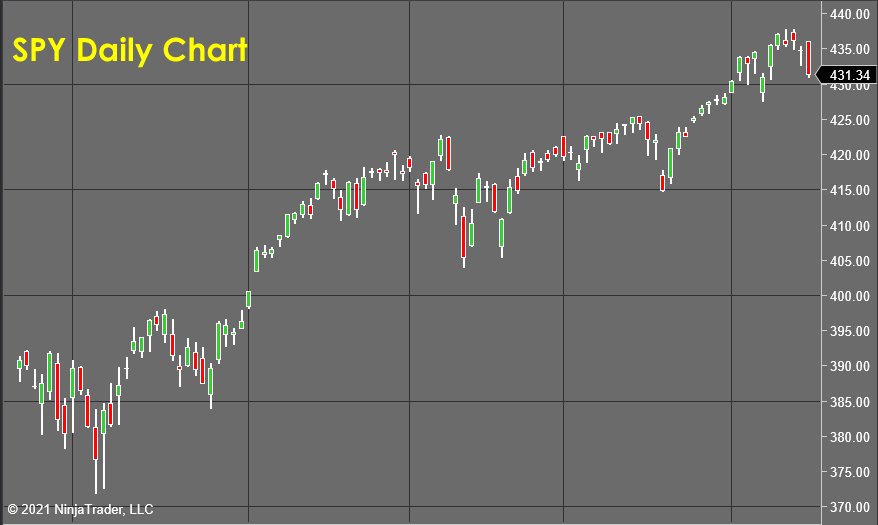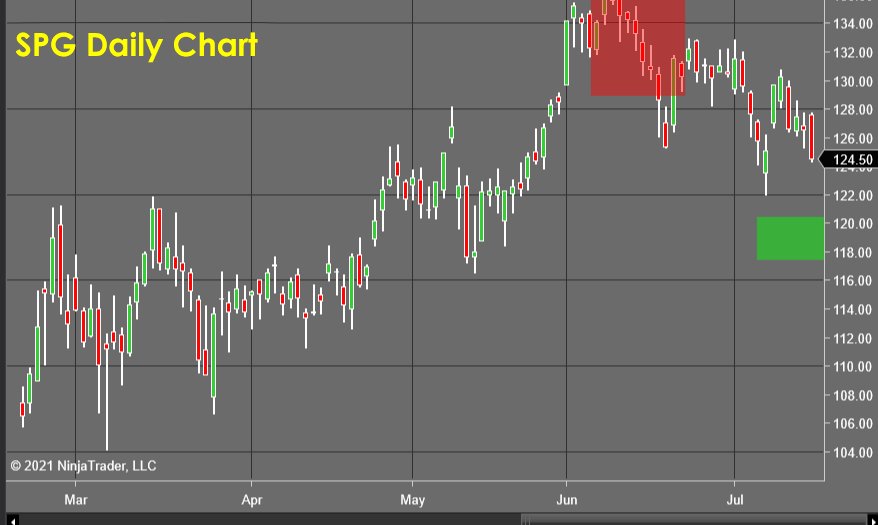This week we have a stock market forecast for the week of 7/18/21 from our friend Bo Yoder of the Market Forecasting Academy. Be sure to leave a comment and let us know what you think!
The S&P 500 (SPY)

The rally in the S&P 500 (SPY) fizzled out this week as forecast, and while the forces I am able to observe and measure in the index itself didn’t collapse into bullish domination, the bears were really mauling all the potential longs on my watchlist.
I would expect to see the selling continue as a correction form but wouldn’t expect a full market break this week unless external news pounds an already vulnerable market.
This upcoming week is a “wait and see” week as the best opportunities I was able to find only carried a 60%-65% chance for success. With the likely stop losses coming in HOG and NKTR, I have used up my “aggression budget” for the time being and am gearing down into a more conservative posture.
Simon Property Group (SPG)

On Monday, Simon Property Group (SPG) failed to weaken substantially, so this trade triggered a scratch for a small loss. However, this is one of those times that can emotionally put a trader’s head into the blender, so it’s worth a mini-lesson.
Everything I do when forecasting is based on an objective reading of the odds.
This is the same as watching poker on TV and seeing the odds for a win displayed in each player's hand down at the bottom of your screen. Each cycle, correction, or wave pattern that a stock produces is similar to having a new community card dealt in poker.
Once the cycle is complete, I can take another objective reading (just like the poker players)... and determine how the odds have shifted either for me or against me.
It takes no skill to manage open positions when the odds are obvious... However, when things are a lot more ambiguous than it's time to get more nuanced and tactically strategic.
In SPG, I was just forecasting a down cycle I was trying to capture that limited profit opportunity. Therefore I am less willing to let the stock misbehave because I don't have as powerful a foundation in trend to ensure the success of the forecast.
Also, I'm stuck with the discipline of weekly observations and changes in forecasting based on the publishing schedule of these forecasts. Both work to reduce accuracy and precision… the same way that a meteorologist would lose accuracy and precision if the only weather forecasts published were for the week to come.
One important shift in perspective that must be made if one wishes to switch from gambling amateur to consistent professional is to stop worrying about profits. Instead, your focus should be on finding trades that are unlikely to lose you money... and with that perspective shift and focus on process; profits are an inevitable byproduct of the math of profitability.
I understand fully that this seems like an inconceivable statement for someone just starting out with stars in their eyes and greed in their belly, but those “money chasers” either blow up, flame out, burnout awfully quickly as their ceaseless chasing of profits turns a blind eye to portfolio risk, risk management, and mitigation.
The same way that I could foolishly and aggressively offer five new forecasts this week, all with mediocre chances for success... just to “stay active,” these traders feel like activity equals profitability.
In reality, when you've seen as many trade logs as I have over the last 20 years, you start to realize that there is a distinct pattern... Those who are the pickiest pick up the most profits.
Because the real game in trading is NOT finding money and creating profits, it's KEEPING those profits and not giving them back to the market.
So when you see me get passive and withdraw from the markets, it's usually because the odds have dropped down below 70% to 80%, and it’s simply not worth the bother to flip coins when there is something as serious as my livelihood on the line.
Nektar Therapeutics (NKTR)

Nektar Therapeutics (NKTR) was a lower probability (65%) trade with huge profit potential, and at the close of the week, it sure looks doomed….However, no trade is done until it’s exited, so I will force this to trigger stop losses below the $16 per share area.
I'll never forget an iconic trade I took in Procter and Gamble early on in my career. I entered the trade, put the stops below the lows, and immediately enjoyed a rally up for a 6% gain. Unfortunately, the market then topped out and began to fall off badly.
I lost all of my open profits, then started to take some heat as the price broke down below my break-even level... The bears dominated that stock all the way back down to the lows.
I remember feeling so terrible, as it seemed inevitable that this trade was going to stop out for a loss, and I was constantly recriminating myself as I second-guessed my choice not to take profits “when I had them.”
As you probably already suspect, there was no real evidence for me to make an exit decision on, and in fact, all the signs pointed for a long sustained rally to the upside, so I did the right thing. As a result, the price came within 3 pennies of my stop loss level, reversed, and began to rally like a rocket launched at the moon.
It delivered a strong double-digit gain for me and has always acted as an iconic lesson that I recall any time I'm feeling an emotional pull towards taking an impulsive action that is not based on the odds or any other hard data.
I can't tell you how many times the trades that I felt were slam dunks failed, and the trades that I was sure were going to stop out and cost me money that reversed and ended up hitting my profit targets.
In the beginning, you connect your ego and self-worth to the success or failure of your trades. This is emotional suicide as it creates tremendous psychological pressure, leading to impulsive and emotional actions. Once you can become truly detached and literally care nothing about whether an individual trade succeeds or fails because you are so hyper-focused on the long-term results that you intend to achieve…Magic happens, and everything starts to produce in a cyclical and consistent manner.
These are just the sorts of lessons that I find have the most impact on traders' results once they master the basic technical skills of our proprietary market forecasting process, which we teach at Market Forecasting Academy. Like so many things in life, trade management is one of those “80/20” things, where 80% of your profitability and consistency comes from your consistency in execution, whereas you probably spent 80% of your focus on the technical aspects of the tactics and strategies which in reality only produce 20% of your true profitability.
Harley-Davidson, Inc. (HOG)

Harley-Davidson, Inc. (HOG) was one of the nicest patterns I have seen on the long side in a while, and like watching a piece of artwork get vandalized, the fact that it gave up the ghost so easily makes me sad.
But to circle back to the poker analogies I wrote about earlier, it also makes me sad when I go “all in” with a pair of kings, and the only person to call turns over a pair of tens. Then proceeds to hit a 20% chance to get a final ten on the river to take all my money!
In both cases, the correct play is to move on without angst because you did the right thing based on the mathematics of odds when you had a choice in the matter.
To Learn How To Accurately and Consistently Forecast Market Prices Just Like Me, Using Market Vulnerability Analysis™, visit Market Forecasting Academy for the Free 5 Day Market Forecasting Primer.
Check back to see my next post!
Bo Yoder
Market Forecasting Academy
About Bo Yoder:
Beginning his full-time trading career in 1997, Bo is a professional trader, partner at Market Forecasting Academy, developer of The Myalolipsis Technique, two-time author, and consultant to the financial industry on matters of market analysis and edge optimization.
Bo has been a featured speaker internationally for decades and has developed a reputation for trading live in front of an audience as a real-time example of what it is like to trade for a living.
In addition to his two books for McGraw-Hill, Mastering Futures Trading and Optimize Your Trading Edge (translated into German and Japanese), Bo has written articles published in top publications such as TheStreet.com, Technical Analysis of Stocks & Commodities, Trader’s, Active Trader Magazine and Forbes to name a few.
Bo currently spends his time with his wife and son in the great state of Maine, where he trades, researches behavioral economics & neuropsychology, and is an enthusiastic sailboat racer.
He has an MBA from The Boston University School of Management.
Disclosure: This article is the opinion of the contributor themselves. The above is a matter of opinion provided for general information purposes only and is not intended as investment advice. This contributor is not receiving compensation for their opinion.

I am Lee Yoder !! My dad was Amish !! I am 87, about the last "first gen. worldly" living !! Glad to see you "stepping up" in the world !! I am in the stock market, but you are way ahead of me & that is great !! Any "words of wisdom" you want to share would be marvelous !! Good to know another Yoder in the market!
That's so great to hear! My Yoder family came from the Indiana branch, and left the Mennonite world in my grandfathers generation.
Words of wisdom would be....
Trading is simpler than most make it.
Consistency is all about saying "no" to almost everything which is HARD for a human brain to handle, and thus most lose money and fail at this business.
Focus more on the math of position sizing and EV or expected value than indicators or setups or tactics, that's where the money is.
Get ready to work on your inner game, as most losing traders throw away their edge due to emotional and impulsive acts.
Focus on consistency, which is the key to compounding, which is the key to creating true wealth with your trading efforts.
Bo, I think NKTR may be close to putting in a "double bottom".
Don't berate yourself for the failed chart patterns - when the market breaks down like it did last week, it will drag down most stocks with it, regardless of how good their chart looked.
The chart pattern for some stocks like Apple still look good.
Thanks for the kind words...
You are right, I never take a failed forecast personally...I know I was going with the odds stacked in my favor, and that in the long term that will express itself very positively for me as it always has.
"Recency Bias" is a very real thing in the human brain and causes a lot of traders to make emotional and impulsive choices that cost them money!